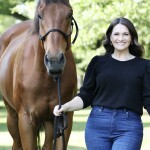As equestrians, our horses are more than just animals. They are our partners and friends who offer unwavering loyalty and companionship. However, we often overlook the fact that horses see us differently than we see them. Understanding how our horses see us can help us better understand them, and help strengthen our relationship.
First, horses are incredibly intuitive creatures that can sense our body language. They have an innate ability to read our posture, tone, and movements, which can reveal our level of confidence or fear. For instance, a horse’s ears will pin back if a person looks or sounds aggressive, while they will perk up to signal curiosity or friendliness. Therefore, it’s essential to learn how to communicate with a horse through our body language, as it can determine the foundation of trust and respect in our relationship.
Second, a horse can pick up on our energy levels, which directly affects their fight or flight mentality. If a horse senses anxiety or fear from their human, they may perceive danger and want to flee. Conversely, if a horse senses calmness and assertiveness, they will feel safe and secure in their environment. Horses are naturally programmed to be flight animals, so it’s important to maintain a calm and confident demeanor to prevent any unwanted or dangerous situations.
Third, our body language and energy levels can significantly impact the horse’s confidence and trust in us. Horses are social animals that need to know their place in a hierarchy, and they often look to humans for guidance. If a person is inconsistent or unsure in their communication and actions, it can confuse a horse and cause them to mistrust. In contrast, if a person sets clear boundaries and expectations through their body language and energy levels, it can establish a positive and respectful relationship between horse and human.
Finally, positive reinforcement training is an effective way to strengthen the bond between horse and human. This training method focuses on rewarding good behavior through praise rather than punishing bad behavior. Not only does it encourage trust and respect between horse and human, but it also improves communication and problem-solving skills. Positive reinforcement training allows both horse and human to work together to accomplish tasks and reach goals, which ultimately cultivates a deep and fulfilling partnership.
Horses offer incredible companionship and loyalty to their humans, but it’s important to remember that they perceive us differently than we perceive them. By understanding how horses sense our body language and energy levels, we can maintain a positive and respectful relationship with them. Moreover, positive reinforcement training can strengthen the bond by encouraging trust, respect, and effective communication. Let’s continue to nurture our relationships with these remarkable animals and appreciate the unique perspective they bring to our lives.









